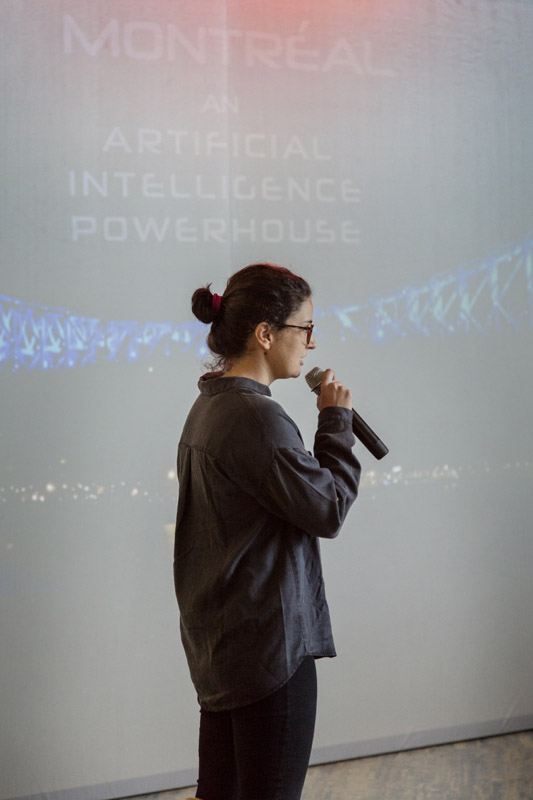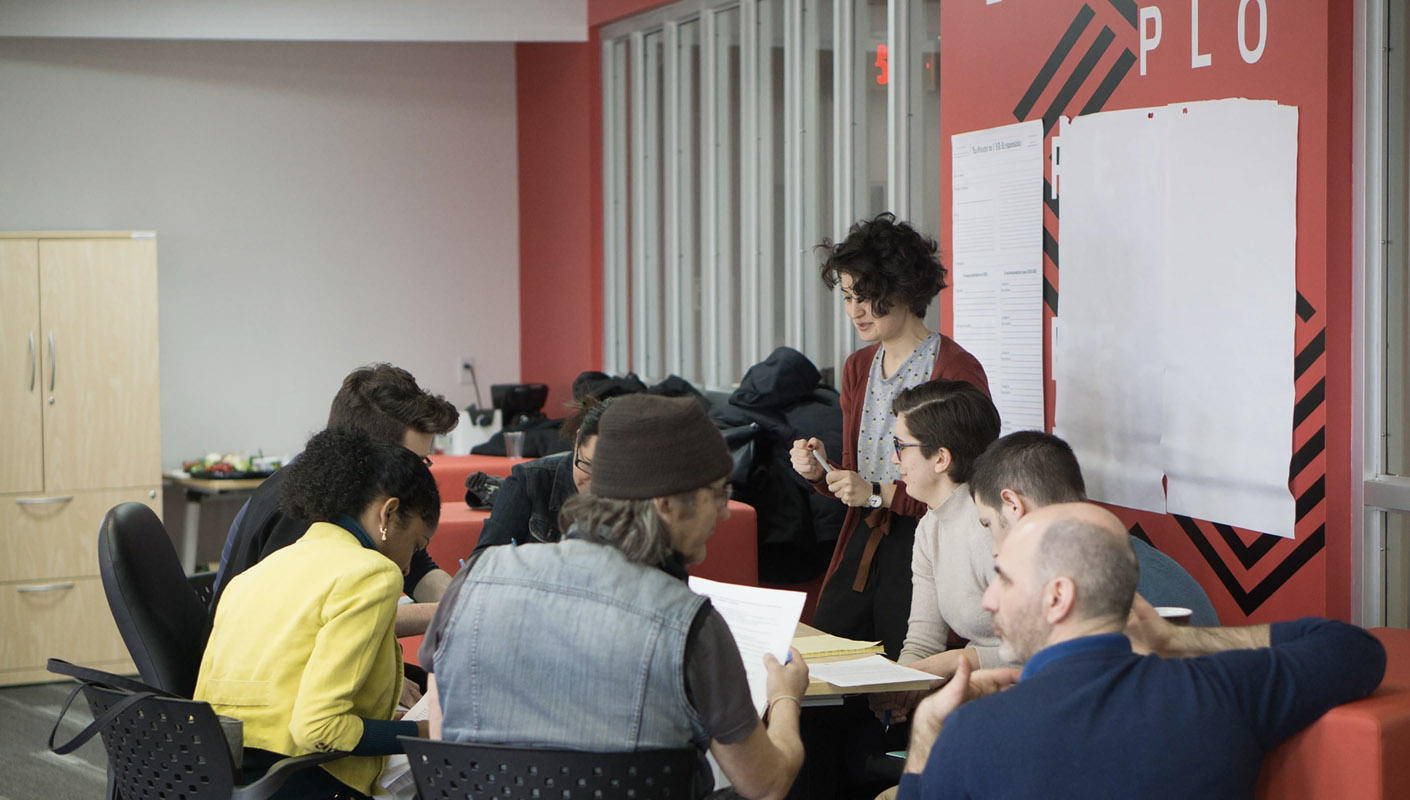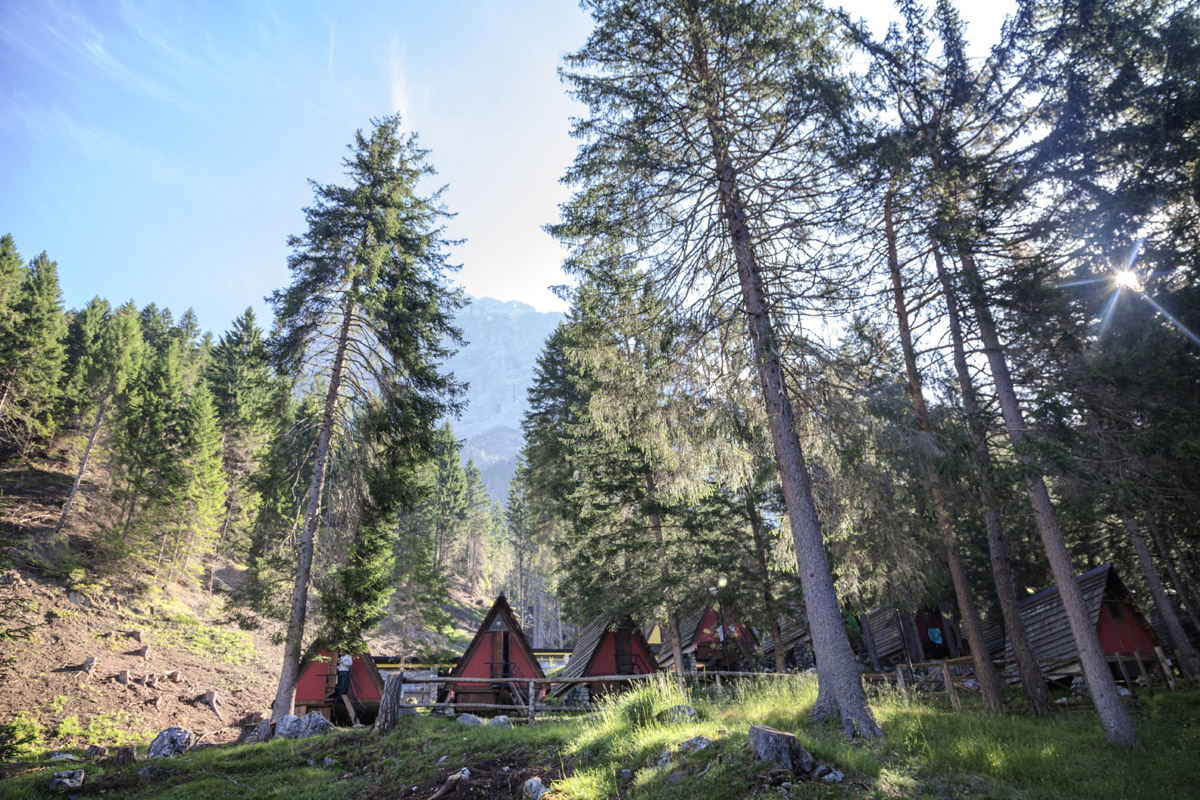SIMPOSIO, a project-event organised by NONE, came to an end a few days ago. NONE is a young Italian collective of architects interested in researching the boundaries of identity, the relationship between man and machine, cinema and art, and all the changes in history and technology shaping the relationship which catch their attention. This year, SIMPOSIO took place at the ENI Village in Borca di Cadore (July 4-7, 2019), surrounded by the mountains and spirit of the Dolomites, with the aim of creating a genuine community, stimulating perception, critical engagement and in-depth thinking to try and create new models for understanding contemporary life with which to create new worlds. Angelo di Bello has spoken about the event for some time on Arshake with Waiting for SIIMPOSIO and he will discuss this again soon in order to describe his experience. In the meantime, we spoke to Alessia Zarzani, who travelled from Montréal to SIMPOSIO to discuss the unique experience she had collaborating in the Montréal Declaration for the Responsible Development of Artificial Intelligence (AI). The interview took place by e-mail on July 2, 2019.
E.G.Rossi: Can you tell us about your research? And how a landscape architect came to be part of a research project on ethics and AI?
Alessia Zarzani: The Montréal Declaration for the Responsible Development of Artificial Intelligence (AI), published in December 2018, is a vademecum for mankind, the political sphere, industries and citizens. It lays down 10 ethnical principles and makes 8 recommendations to ensure that man maintains control over machines.
Launched in autumn 2017 by the University of Montréal, it was the result of eighteen months of intense work by a trans-disciplinary research team made up of philosophers, urban architects, lawyers, bio-ethicists, IT specialists and experts in human and machine learning, and also included dozens of events and workshops organized to co-edit the Declaration, involving over five hundred interested citizens, experts, organizations and no profit associations. The declaration is a roadmap that tries to outline the associated ethical principles in a sector that is more and more expanding and whose power and ability to change society is remarkable.
That I became part of this research team was the result of a chain of fortunate events. In 2016, as a doctoral landscape student, I was a teaching assistant alongside Professor Alessandra Ponte, a landscape historian, at the University of Montréal. I would like to stress that when we are speaking of Landscape, this does not only include arts and gardens, but also learning how lands are formed and how they encompass different cultural and economic ecosystems and values. During the winter term 2017, we designed a course on “Research by Design” (a research lab in the architecture program) asking why Montréal still wants to become the new Silicon Valley for Artificial Intelligence. The starting point of this research was a reflection on how easy it is to forget the apparent immateriality and ubiquity of information which today needs to be translated into new types of architecture and global urban strategies in order to host infrastructure systems that can circulate, archive, recover and order the mass of data produced by users. This research work, carried out with the students, offered the opportunity to produce a new cartography, turning information into a material for architecture. In October 2017 the results of this research seminar were published and ended up in the hands of Christophe Abrassart, who was responsible for the coordination of the Declaration and who then contacted me to ask whether I was interested in collaborating. I was specifically given the task of creating future scenarios for different public questions involving Smart Cities, including AVs (Autonomous Vehicle systems) and IoT (Internet of things). I co-wrote differents short stories dealing with infra-utopian imaginary scenarios which were aimed at facilitating a conversation about different ethical problems that should be publicly discussed. My collaboration as a researcher with the Declaration continued up to the data analysis, the final editing stage was in December 2018.

You were saying that your work method consisted of creating scenarios, stories – sometimes dystopian – that were later read in the libraries of Montréal to encourage discussions on ethical principles. How did you construct these stories? Who was your audience? What was the feedback like compared with your expectations?
That I became part of this research team was the result of a chain of fortunate events. In 2016, as a doctoral landscape student, I was a teaching assistant alongside Professor Alessandra Ponte, a landscape historian, at the University of Montréal. I would like to stress that when we are speaking of Landscape, this does not only include arts and gardens, but also learning how lands are formed and how they encompass different cultural and economic ecosystems and values. During the winter term 2017, we designed a course on “Research by Design” (a research lab in the architecture program) asking why Montréal still wants to become the new Silicon Valley for Artificial Intelligence. The starting point of this research was a reflection on how easy it is to forget the apparent immateriality and ubiquity of information which today needs to be translated into new types of architecture and global urban strategies in order to host infrastructure systems that can circulate, archive, recover and order the mass of data produced by users. This research work, carried out with the students, offered the opportunity to produce a new cartography, turning information into a material for architecture. In October 2017 the results of this research seminar were published and ended up in the hands of Christophe Abrassart, who was responsible for the coordination of the Declaration and who then contacted me to ask whether I was interested in collaborating. I was specifically given the task of creating future scenarios for different public questions involving Smart Cities, including AVs (Autonomous Vehicle systems) and IoT (Internet of things). I co-wrote differents short stories dealing with infra-utopian imaginary scenarios which were aimed at facilitating a conversation about different ethical problems that should be publicly discussed. My collaboration as a researcher with the Declaration continued up to the data analysis, the final editing stage was in December 2018.

f some of the important decisions are taken on the basis of algorithmic calculations, how should the responsibility for these choices be distributed?
In general, as noted in the Declaration to be found online, the principles and recommendations that were developed by the team of researchers have precisely this aim: they should help to develop the algorithms in an responsable way. As laid out in the final report, the principles and recommendations of this Declaration represent an ethical compass guiding the development of Artificial Intelligence towards morally and socially desirable aims. The Declaration is a tool to facilitate this digital transition, safeguarding the welfare, freedom and equality of all.

You took part in the project as a landscape architect. What disciplines and professions were invited to collaborate with your project? Are there any others you feel should be involved and which have not yet been included?
As a first approach, 5 key areas for AI development were identified: education, judicial and predictive policing, health, employment, smart cities and IoT. Following the activities carried out, four other topics emerged: numerical literacy, inclusion of numerical diversity, participatory governance and the environment. Different researchers specialising in these areas found themselves collaborating with experts in philosophy, sociology, robotics, landscape sciences, design, criminology, bioethics, criminology, deep learning and data science, etc.
All disciplines are and will be required to reflect on the topic. The Declaration represents the first step in a collective and democratic thinking process. As noted in the Declaration, this document offers open guidelines that can be adapted as the knowledge and techniques used by AI in society will further develop.
 For SIMPOSIO you were immersed in nature, deep in the mountains of Veneto, discussing technology. I wanted to ask what significance nature has for you. Should we rethink the term “nature” in light of those who have surrendered to the idea that nature is entirely a cultural construct and that, as such, must be completely reinterpreted?
For SIMPOSIO you were immersed in nature, deep in the mountains of Veneto, discussing technology. I wanted to ask what significance nature has for you. Should we rethink the term “nature” in light of those who have surrendered to the idea that nature is entirely a cultural construct and that, as such, must be completely reinterpreted?
According to Clement, a landscape theorist, nature as an element that is untouched by man does not exist; instead we find a new, wild, changing, and rebellious landscape. According to Clement, we find ourselves in a global garden which man must care for. The architect Buckminster Fuller, in the 1970s, spoke of our planet and its natural ecosystem, calling it an earth space ship and providing us with an instruction manual to prevent total destruction. I think the time has come to write a contemporary manifesto that incorporates new technology into this debate and I believe that at Simposio, where we are surrounded by the Dolomites, several elements exist which can inspire this collective reflection.
Alessia Zarzani graduated in architecture and urban design (Sapienza University, Rome). After investigating the metropolis and the informal urbanism in Rio de Janeiro, she received in 2018 her PhD in a joint program in Design at the University of Montréal and in Planning and Management of Landscape and Environment at the Sapienza University of Rome. She is currently adjunct professor in Landscapes and urban spaces and History theories and practices of contemporary landscape at the Ecole d’architecture de paysage et urbanisme of the Université de Montréal. In parallel Alessia Zarzani collaborates with a research group at UdeM on Artificial Intelligence and Urban Design, and senior researcher the “Montréal Declaration for a responsible AI”.
images: (cover 1) Simposio plenario – Aula Magna. Villaggio ENI. photo credits Cristina Vatielli – NONE collective (2) Alessia Zarzani – Simposio. photo credits Cristina Vatielli – NONE collective (3) Architecture et information 2.0, Université de Montreal, 2017, slide,copyright Montréal Declaration for the Responsible Development of Artificial Intelligence (AI) (4) A. Ponte, A. Zarzani(2017), Architecture et information 2.0, Université de Montreal, copyright Montréal Declaration for the Responsible Development of Artificial Intelligence (AI) (5) Simposio, Campeggio. photo credits Cristina Vatielli – NONE collective









































